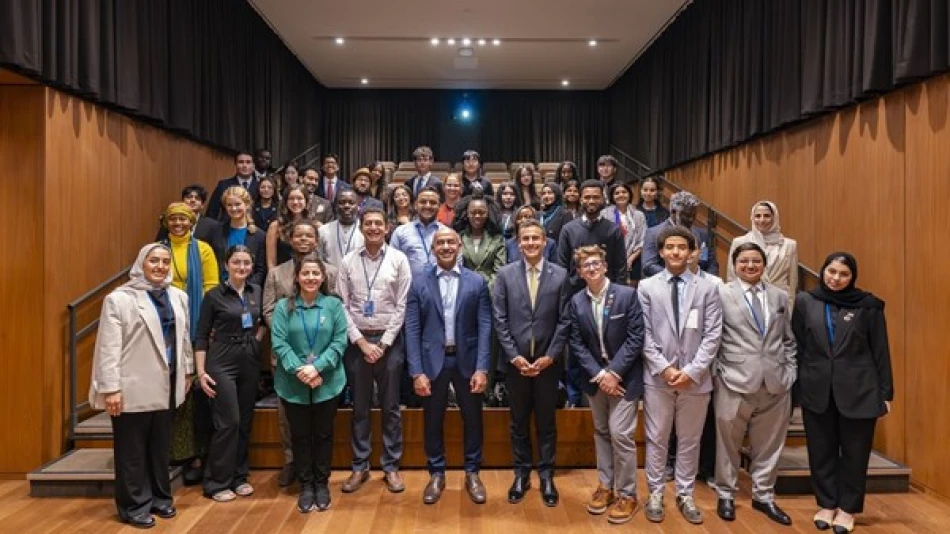
UAE Hosts Global Youth Dialogue on Sustainable Development at UN in New York
UAE Positions Youth as Central Players in Post-2030 Global Development Vision
The United Arab Emirates is spearheading a bold initiative to reshape how the world approaches sustainable development beyond 2030, placing young people at the center of policy-making rather than treating them as passive beneficiaries. At the UN's High-Level Political Forum on Sustainable Development in New York, the UAE organized a groundbreaking youth session that signals a fundamental shift in global development strategy—one that could determine whether the next generation of sustainability goals succeeds where current efforts have fallen short.
Beyond Traditional Development: The 2045 Vision Takes Shape
The session, titled "Voices for 2045: Youth Shaping the Future," brought together 40 participants from the UN General Assembly's Major Group for Children and Youth to discuss the Extended Sustainable Development Goals (XDGs 2045). This ambitious framework, first unveiled at the World Government Summit in 2023, represents a significant evolution from the current 2030 Agenda for Sustainable Development.
Unlike previous top-down approaches to global development planning, the UAE's initiative recognizes that those who will live with the consequences of today's decisions—young people—should have a meaningful voice in shaping them. This represents a strategic pivot that could address one of the key criticisms of current sustainability efforts: their disconnect from the populations they aim to serve.
Strategic Timing and Political Calculation
The timing of this initiative is particularly significant. As the 2030 Sustainable Development Goals face mounting criticism for slow progress and implementation gaps, the UAE is positioning itself as a forward-thinking leader in the next phase of global development planning. By hosting this dialogue at its UN mission, the Emirates demonstrates its commitment to multilateral engagement while showcasing its domestic youth empowerment policies on an international stage.
Market and Investment Implications
For investors and development finance institutions, the UAE's approach signals important shifts in how sustainable development projects may be structured and funded post-2030. The emphasis on youth engagement suggests future development initiatives will likely prioritize digital innovation, climate technology, and educational infrastructure—sectors where young people have both expertise and stake in outcomes.
The focus on "empathy, passion, and action" as core pillars also indicates that environmental, social, and governance (ESG) criteria may evolve to include more robust youth participation metrics. This could create new investment opportunities in companies and projects that demonstrate genuine youth engagement rather than token consultation.
Competitive Positioning Among Global Powers
The UAE's proactive stance on youth-centered development planning puts it ahead of regional competitors and aligns with similar initiatives in Singapore and parts of Europe. However, it contrasts sharply with more traditional approaches still favored by larger powers, potentially giving the Emirates outsized influence in shaping post-2030 development frameworks.
Addressing Implementation Challenges
Abdullah Nasser Lootah, Assistant Minister for Cabinet Affairs for Competitiveness and Knowledge Exchange, emphasized that meaningful youth participation requires "open dialogue, collective participation, and bold ideas that keep pace with global changes." This acknowledgment suggests the UAE recognizes that previous development goals have failed partly due to insufficient stakeholder engagement.
The session's interactive format, using electronic surveys to gather diverse perspectives on personal motivations, future transformations, and implementation barriers, represents a methodological advance over traditional policy consultation processes. This approach could become a model for other countries seeking to improve their development planning processes.
Beyond Rhetoric: Measuring Real Impact
The true test of this initiative will be whether it produces concrete policy changes and resource allocations that reflect youth priorities. The UAE's track record on youth empowerment domestically—including significant investments in education technology and green economy training—suggests this is more than diplomatic positioning.
Global Development Architecture in Transition
The High-Level Political Forum's focus on five specific goals—health and well-being, gender equality, economic growth and decent work, ocean conservation, and global partnerships—provides a framework for evaluating how youth perspectives might reshape development priorities. Young people's emphasis on climate action, digital access, and intergenerational equity could significantly influence resource allocation and policy design in these areas.
As the international community prepares for the post-2030 development agenda, the UAE's youth-centered approach may prove prescient. Countries that fail to meaningfully engage their young populations in development planning risk creating policies that lack both legitimacy and effectiveness. The Emirates, by contrast, is positioning itself to lead a more inclusive and potentially more successful approach to global sustainable development.
Most Viewed News

 Layla Al Mansoori
Layla Al Mansoori






